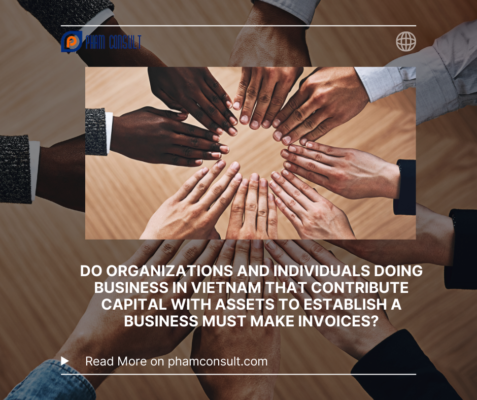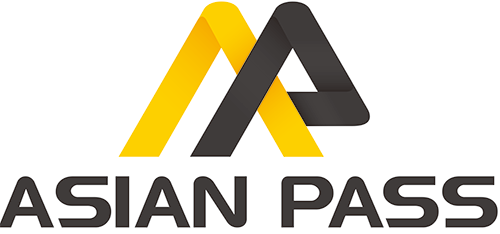Whether contributing capital with assets requires an invoice or not is a concern of many investors. Join Pham Consult to learn about this issue through the article below to ensure legal compliance and avoid risks arising when contributing capital.

Do organizations and individuals doing business in Vietnam that contribute capital with assets to establish a business have to issue invoices?
Pursuant to Clause 3, Article 13 of Decree 123/2020/ND-CP regulating the application of invoices when contributing capital with assets to establish an enterprise as follows:
Apply electronic invoices when selling goods and providing services
…
3. Regulations on the application of electronic invoices, warehouse delivery notes cum internal transportation, warehouse delivery notes consigned to agents for a number of specific cases according to management requirements as follows:
…
d) Organizations and individuals exporting goods for mobile sale use warehouse delivery notes and internal transportation according to regulations, and when selling goods, issue electronic invoices according to regulations.
e) In case of capital contribution using assets of organizations or individuals doing business in Vietnam to establish an enterprise, you do not have to issue an invoice but use documents such as capital contribution certificate and asset delivery record. , asset valuation minutes accompanied by a set of documents on asset origin.
g) In case of asset transfer between dependent accounting member units in the organization; When transferring assets when dividing, separating, consolidating, merging, or converting the type of enterprise, the organization with the transferred assets must have an asset transfer order, accompanied by a dossier on the origin of the assets and is not required to prepare a transfer order. bill.
h) In case assets are transferred between independent accounting units or between member units with full legal status within the same organization, the organization having the transferred assets must issue an electronic invoice. like selling goods.
…
Comparing with the above regulations, in cases where organizations and individuals doing business in Vietnam contribute capital with assets to establish a business, they do not have to issue invoices but use documents certifying capital contribution and minutes. Asset delivery and receipt, asset valuation minutes accompanied by a set of documents on asset origin.
Who must value assets contributed as capital when establishing a business?
The valuation of assets contributed as capital when establishing an enterprise is prescribed in Article 36 of the Enterprise Law 2020 as follows:
Valuation of capital contribution assets
…
2. Assets contributed as capital when establishing an enterprise must be valued by members and founding shareholders according to the principle of consensus or by a valuation organization. In case a valuation organization conducts a valuation, the value of contributed assets must be approved by more than 50% of the members and founding shareholders.
In case the assets contributed as capital are valued higher than the actual value of that asset at the time of capital contribution, the founding members and shareholders jointly contribute an additional amount equal to the difference between the appraised value. and the actual value of the assets contributed as capital at the end of the valuation; At the same time, jointly responsible for damages caused by intentionally valuing contributed assets higher than the actual value.
3. Assets contributed as capital during operations are agreed upon by the owner, the Board of Members for limited liability companies and partnerships, the Board of Directors for joint stock companies, and capital contributors. valuation or valuation by a valuation organization. In case a valuation organization determines the value, the value of contributed assets must be approved by the capital contributor and the owner, the Board of Members or the Board of Directors.
…
Accordingly, assets contributed as capital when establishing an enterprise must be valued by members and founding shareholders according to the principle of consensus or by a valuation organization.
In case a valuation organization conducts a valuation, the value of contributed assets must be approved by more than 50% of the members and founding shareholders.
In case the assets contributed as capital are valued higher than the actual value of that asset at the time of capital contribution, the founding members and shareholders jointly contribute an additional amount equal to the difference between the appraised value. and the actual value of the contributed assets at the end of the valuation.
At the same time, jointly responsible for damages caused by intentionally valuing contributed assets higher than the actual value.
When is capital contribution by assets to establish a business considered completed?
Pursuant to Clause 3, Article 35 of the Law on Enterprises 2020, regulations on transfer of ownership of assets contributed as capital are as follows:
Transfer of ownership of contributed assets
…
3. Capital contribution is only considered fully paid when legal ownership of the contributed assets has transferred to the company.
4. Assets used in business activities of private enterprise owners do not have to go through procedures to transfer ownership to the enterprise.
5. Payment for all activities of buying, selling, transferring shares and capital contributions, receiving dividends and transferring profits abroad of foreign investors must be made through accounts according to regulations. provisions of law on foreign exchange management, except in cases of payment in assets and other forms not in cash.
Thus, according to regulations, capital contribution with assets to establish a business is only considered completed when legal ownership of the contributed assets has transferred to the company.
Hope the above information will help your work.
Comments




 VI
VI